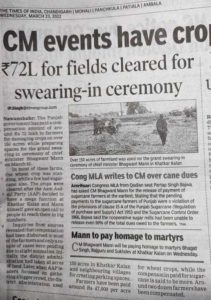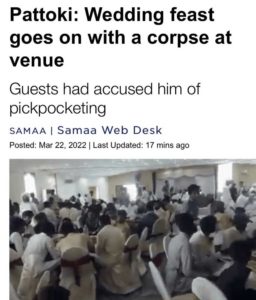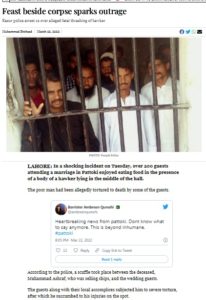The Puppy Dog, lunch with a dead body, and AAP’s Compensation for Crops
In his novel “Dance Dance Dance” that I loved in the late 80s for its idiosyncratic prose, Haruki Murakami says, “What we seek is some kind of compensation for what we put up with.”
![In his novel “Dance Dance Dance” that I loved in the late 80s for its idiosyncratic prose, Haruki Murakami says, “What we seek is some kind of compensation for what we put up with.” Let us be clear: this was not a deal with the farmers. No one told the farmers, “Look, we need to destroy your crops to create acres of parking space because we have to mount a loud and colourful tamasha for an 18 minute formal ceremony […]](https://www.theworldsikhnews.com/wp-content/uploads/2022/03/Crops-360x266.jpg)
Let us be clear: this was not a deal with the farmers. No one told the farmers, “Look, we need to destroy your crops to create acres of parking space because we have to mount a loud and colourful tamasha for an 18 minute formal ceremony that could be done inside a room, and, therefore, we shall need your cooperation. Will you kindly consent to your almost ripe crops being destroyed? We will be highly obliged and shall pay you very handsome amounts as compensation. Shall we go ahead?”
That’s not how those crops were destroyed. The fact is that farmers’ consent is not even asked for. The regime simply takes over the area and does what it wants, and then pays the farmers an amount that it decides. There is no mutual agreement; there is not even a pretense of any agreement. No farmer has the right to object. It’s not that one farmer in the entire lot can opt out. You are expected to lump it.
Let us use the words to mean what they mean. “Compensation” is in lieu of loss suffered. This was an amount in lieu of loss inflicted. This is forced reparation for a loss wreaked upon by a powerful side upon a hapless one, and it is decided by the aggressor.
 In his provocative book, “The Intelligence of Evil: or, The Lucidity Pact,” postmodernist thinker Jean Baudrillard says: “Once the great and the good had the privilege of granting pardon. Today, they want to be pardoned in their turn. They take the view that, on the basis of human rights, they are entitled to the universal compassion that had until now been the prerogative of the poor and of victims.”
In his provocative book, “The Intelligence of Evil: or, The Lucidity Pact,” postmodernist thinker Jean Baudrillard says: “Once the great and the good had the privilege of granting pardon. Today, they want to be pardoned in their turn. They take the view that, on the basis of human rights, they are entitled to the universal compassion that had until now been the prerogative of the poor and of victims.”
Also, we should know what celebrations at a scale witnessed at Khatkar Kalan really, really mean. To me, it was a rather bizzare scene, much like people at a wedding feast moving about with plates loaded with choice cuisine, loud music running the background muffling any thing you might say, and a dead body lying in the middle of it all, flies flitting about on it and no one looking seemingly worried.
Let us use the words to mean what they mean. “Compensation” is in lieu of loss suffered. This was an amount in lieu of loss inflicted. This is forced reparation for a loss wreaked upon by a powerful side upon a hapless one, and it is decided by the aggressor.
Of course, no such incident happened at Khatkar Kalan. It happened yesterday (March 22) in Pattoki in Kasur, an hour’s run from Lahore, midway to Okara. A papad-seller hawking his wares near a wedding venue was assaulted by guests at the ceremony, then dragged him inside the venue where they lynched him to death. As his dead body lay there in a pool of blood, flies flitting around, the guests proceeded to partake the lavish spread without anyone paying heed to the corpse lying in the middle of it all. When the video of scores of people enjoying the feast without being bothered by a dead body lying on one side went viral, authorities immediately swung into action and announced that the dead man’s family will be compensated.
 In a state where the regime claims that more than one-third of families get free atta-dal and the elderly await meagre monthly amounts called ‘old-age pension’ which can’t even buy a decent cup of coffee, we don’t seem much perturbed by the tamasha at Khatkar Kalan. This was Pattoki – our Pattoki. We were actually enjoying that sumptuous feast as dead bodies lay all around. We have become used to living in Pattoki. Our compensation is the slogan of ‘badlaav’.
In a state where the regime claims that more than one-third of families get free atta-dal and the elderly await meagre monthly amounts called ‘old-age pension’ which can’t even buy a decent cup of coffee, we don’t seem much perturbed by the tamasha at Khatkar Kalan. This was Pattoki – our Pattoki. We were actually enjoying that sumptuous feast as dead bodies lay all around. We have become used to living in Pattoki. Our compensation is the slogan of ‘badlaav’.
Lest I ruin your breakfast, rest assured: the regime is compensating the farmers.
The fact is that farmers’ consent is not even asked for. The regime simply takes over the area and does what it wants, and then pays the farmers an amount that it decides.
This is the regime seeking your pardon for having first destroyed your homes and hearths by choice. We have become so used to it. In fact, without being a party to it, we rush to become one. “X used to do the same; did Y not do exactly this?”
 Yes, and you are also revealing a little bit of yourself — that you were not shocked by the sheer egregiousness of it all!
Yes, and you are also revealing a little bit of yourself — that you were not shocked by the sheer egregiousness of it all!
John Steinbeck has explained why we have become who we are. Read this revelatory snippet from “East of Eden:”
“And as a few strokes on the nose will make a puppy head shy, so a few rebuffs will make a boy shy all over. But whereas a puppy will cringe away or roll on its back, groveling, a little boy may cover his shyness with nonchalance, with bravado, or with secrecy. And once a boy has suffered rejection, he will find rejection even where it does not exist—or, worse, will draw it forth from people simply by expecting it.”
We expect it. We crave for it. On a rare occasion when the regime doesn’t inflict it, we almost yearn for it. And then we expect to be compensated for it. We, the puppy dogs!
(How did it feel? Should I compensate you for that feeling?)
(From a WhatsApp group post by SP Singh)
